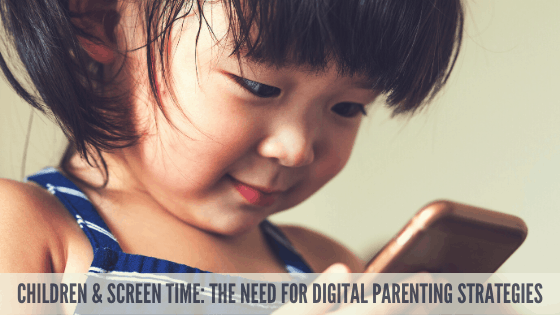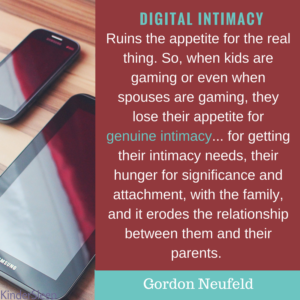
The world is changing rapidly and along with that parenting is also evolving. There are many unknowns in our modern world – Is childhood also different now than it was 30 years ago? One of the big influences today is the prevalence of screen media in our daily lives. No longer is the TV just in one room of the house. Now with the wondrous capabilities of cell phones and tablets, screen time can be had anytime and anywhere. How has this changed family life? What do we need to know?
One study showed that 97% of children under 4 years old used a mobile device on a daily basis. This included 44% of Children under 12 months and 77% of 2-year-olds.
If you are giving your child a device to keep them busy or to keep them calm, you are not alone. 65% of parents report using mobile devices to keep their child calm in public places.
How does screen time impact children?
Decades ago, it was common to see a toddler playing with a toy phone or watching an hour of Sesame Street each day. Now with technology developing so quickly, young children are often using real phones and handheld tablets and can watch programming at anytime in the day. Research on the impacts of digital tech is hardly able to keep up, but there are some interesting findings that screen time, either on handheld devices or television, are having on children and families.
-
- Brain Development – There are concerns that screen time in the early months and years can significantly impact development
-
- Attention span – Long-term impacts of stimulating, rapidly changing images, and events on television may shorten a child’s attention span and can lead to ADHD, particularly with early exposure during critical periods of brain development
-
- Learning – Infants and toddlers learn better from interaction and observations with people than they do from watching television or screen programming
-
- Sleep – Children who are exposed to screens in the evening sleep a shorter length of time at night, this is a result of a reduction of Melatonin from exposure to the kind of blue light that are emitted from screens and televisions as will as, viewing activating content
-
- Delay in language development – Studies have also shown a correlation between television viewing and language development for babies under 24 months of age
-
- Impacts on relationships and learning – Screen time can reduce the amount of nurturing experiences with parents and caregivers. Which would also reduce opportunities for social, emotional and cognitive learning
-
- Emotional wellbeing – A large study of children between 2 and 9 years old, showed that the more screen media a child was exposed to, resulted in an increased likelihood of emotional challenges and poorer family function
-
- Violent and aggressive behaviors – There is evidence that viewing violence on media increases the likelihood of violent and aggressive behaviors in children and adults. Children may act out what they see on screens or become desensitized to violence

Recommendations for Screen Time
Many of the potential negative impacts of screen time can be mitigated with some recommended digital parenting strategies:
-
- Avoid Television and screen media with children under 2 years of age except for video chatting to stay in touch with loved ones
-
- Limit the amount of screen time your child gets. The AAP recommends children 2-5 years old get a maximum of 1 hour of high-quality programing per day. You can also create your own custom media plan on the AAP’s parent website
-
- You don’t need to introduce technology early; children will be able to pick up skills quickly when appropriate
-
- Interact with your child as much as possible. Make eye contact, read, sing and count with them. Make a personal connection before your child tunes into the device.
-
- If you are using media, choose high quality programming and stay with your child and communicate during the viewing
-
- Turn off the TV when it’s not in use. Even background TV can impact children
-
- To prevent impacts to sleep, avoid screens in the evening, especially within one hour of bedtime
-
- Be a positive digital role model for your children and let them know that you prioritize them over your device. In a article posted by Atlantic Magazine, The Dangers of Distracted Parenting, author Erika Christakis stated: “When it comes to children’s development, parents should worry less about kids’ screen time—and more about their own”
Screen time is not going away, it is so integrated into our lives today and that is only likely to get more pervasive. Putting our children in front of a screen may make parenting easier in the short-term but we need to consider setting limits and moderating screen use with our children (and also ourselves) to avoid problems down the road.
Gordon Neufeld discusses digital intimacy in his book Hold on to your Kids. Citing that digital media use may seem to fulfil a deep need for connection with instant gratification but true attachment needs are not met through media and positive feelings are short-lived, which can create a greater desire to consume more screen media, and even media addiction. This can result in people being impulsive, inconsiderate and having a lack of self-control.
It is important to be proactive and vigilant about media use in our families through setting limits and prioritizing our relationship with our children over technology.
Screen Media and the Threat of Disconnection:

Resources
Brisson-Boivin, K. (2018). The Digital Well-Being of Canadian Families. MediaSmarts, Ottawa Emarketer https://www.emarketer.com/Article/Digital-Set-Surpass-TV-Time-Spent-with-US-Media/1010096
Digital media: Promoting healthy screen use in school-aged children and adolescents. (2019). Paediatrics & Child Health, 24(6), 402–408. doi: 10.1093/pch/pxz095
Gray, C., Larouche, R., Barnes, J., Colley, R., Bonne, J., Arthur, M., … Tremblay, M. (2014). Are We Driving Our Kids to Unhealthy Habits? Results of the Active Healthy Kids Canada 2013 Report Card on Physical Activity for Children and Youth. International Journal of Environmental Research and Public Health, 11(6), 6009–6020. doi: 10.3390/ijerph110606009
Hinkley, T., Verbestel, V., Ahrens, W., Lissner, L., Molnár, D., Moreno, L. A., … Bourdeaudhuij, I. D. (2014). Early Childhood Electronic Media Use as a Predictor of Poorer Well-being. JAMA Pediatrics, 168(5), 485. doi: 10.1001/jamapediatrics.2014.94
Huesmann, L. R. (2007). The Impact of Electronic Media Violence: Scientific Theory and Research. Journal of Adolescent Health, 41(6). doi: 10.1016/j.jadohealth.2007.09.005
Jackson, DB. Does TV viewing during toddlerhood predict social difficulties and conduct problems? Inf Child Dev. 2018; 27:e2086. https://doi.org/10.1002/icd.2086
Kabali, H. K., Irigoyen, M. M., Nunez-Davis, R., Budacki, J. G., Mohanty, S. H., Leister, K. P., & Bonner, R. L. (2015). Exposure and Use of Mobile Media Devices by Young Children. Pediatrics, 136(6), 1044–1050. doi: 10.1542/peds.2015-2151
Neufeld, G. (2012). Keys to Well-Being in Children and Youth – Brussels Report. Neufeld Institute https://neufeldinstitute.org/wp-content/uploads/2017/12/Neufeld_Brussels_address.pdf
Neufeld, G., & Maté Gabor. (2019). Hold on to your kids: why parents need to matter more than peers. London: Vermilion.
Rideout VJ, Hamel E. The media family: Electronic media in the lives of infants, toddlers, preschoolers and their parents. Kaiser Family Foundation; 2006. http://www.kff.org/entmedia/upload/7500.pdf
Screen time and young children: Promoting health and development in a digital world. (2017). Paediatrics & Child Health, 22(1), 461–468. doi: 10.1093/pch/pxx197
Skaug, S., Englund, K. T. & Wichstrøm, L. ( 2018). Young children's television viewing and the quality of their interactions with parents: A prospective community study. Scandinavian Journal of Psychology, 59, 503– 510.

